|
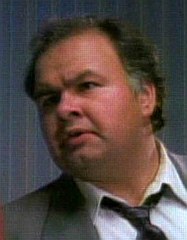
| |
Capt. Joe Stonetree
|
His file arrived before he did (which was not, alas, always the case); and Stonetree read it through carefully. He had not been expecting the transfer, and he was curious—and left with almost more questions when he was finished than he’d had when he’d got the call from the Commissioner. Clearly someone owed somebody else a favour that was being called in: no one transferred into Homicide from Chicago! It was hard enough for a recent immigrant to get on the force; and for sure no one got in without attending the Academy, if only for the legal side of it. Of course, the man might be a returning expatriate….
He flipped back to look, and realized that the box, which he was accustomed to see checked off, had been left blank. No nationality was entered on the line beside it, either. It was presumably a clerical error. Still, he had nothing but questions that he couldn’t answer until the guy turned up. At least the transfer records, which were included, did indicate that this Knight had Homicide experience. Which was something—but not really quite enough.

When Knight sauntered into the station two days later, Stonetree’s worst fears seemed to materialize. He had the mannerisms of a guy with friends at the top; either that or he was related. Stonetree thought gloomily of the last Academy class, which had included Vetter’s kid, and wondered which of them was going to turn out to have the worse bargain: him, or whatever sergeant would be coping with the Commissioner’s pet lamb.
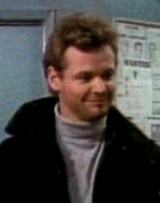
His own was no lamb. Stonetree eyed the black leather jacket. Nowhere in Knight’s records was there any indication that he’d been a motorcycle cop. Leathers had no place on the plainclothes side: Stonetree advocated the three-piece suit, even if his own jacket was slung over the back of his chair, his top shirt button undone, and his tie loose. He, after all, was not waving the flag for justice on a night call to some high mucky-muck in Rosedale who’d come home from the opera to find his maid murdered. The Metropolitan Police Force had an image to protect.
Ah, well. Perhaps Knight rides a hog in his off hours, Stonetree thought; but sure as hell not on call he won’t—not at this precinct!
He summoned a welcoming smile and shook the man’s hand.
“Good to be here, sir,” Knight said, with a wide grin. “The finest force in the country, and Homicide—well, I know I’m lucky to pull this assignment!”
“Glad to have you aboard,” said Stonetree heartily. “Now I just have one or two questions, and then I’ll introduce you to your new partner.”
“Ah, about that, Captain,” Knight said, with a note of apology, “I do actually prefer to work alone.”
“No,” Stonetree said briskly. “I’m not having any lone wolves on my watch—especially when you’re new to Toronto and still getting the lay of the land. I thought I’d pair you with Lee on days for a bit, see how it goes.”
The man before him stiffened, in obvious (albeit suppressed) alarm; and Stonetree’s cop instincts went on alert.
“Ah, you did read my file?” Knight began, a bit uncertainly.
Stonetree frowned.
“There should have been a note? About my medical background?”
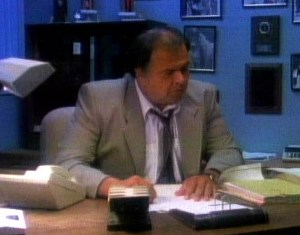 Stonetree flipped open the folder on his desk, turning over the forms until he found the inserted sheet from the physician. “Yeah, I saw it,” he said. “You mean this”—he held it up—“don’t you? It can’t be all that serious, surely? I mean, you passed the physical.” He smiled, to take away any sting.
Stonetree flipped open the folder on his desk, turning over the forms until he found the inserted sheet from the physician. “Yeah, I saw it,” he said. “You mean this”—he held it up—“don’t you? It can’t be all that serious, surely? I mean, you passed the physical.” He smiled, to take away any sting.
Knight smiled back disarmingly. So disarmingly that Stonetree was instantly suspicious, having arrested a few con artists in his day.
“Oh, the condition is stable, Captain. And it doesn’t affect my ability to do my job—not as long as I’m on night shift.”
Stonetree glanced down at the sheet in his hand. It did say that, more or less, though he’d never heard of such a thing in his whole career.
“You mean you want the night shift?” he said, hitting a regretfully incredulous note. Everyone worked nights, of course: it was part of the job. But no one liked it, least of all the guys with kids—which was why there was a shift schedule.
“Always night shift?” he added, hitting that note of disbelief again. Summoning his professional phlegm, he added, “It’ll play hell with shifts, you know.”
“Which is why I work better without a partner,” Knight added instantly, with that bloody grin again.
Gotta give him that one.
“I could partner you up, and have you working opposite shifts half the time,” he said, just to see how the man would react. “Could cover more ground that way,” he added.
“Oh, you don’t want to do that,” Knight said easily. He leaned forward, looking into Stonetree’s eyes—a con ploy, impure and simple—and said, in compelling tones, “Captain, trust me on this….”
Trusting him was, given his manner, the last thing Stonetree felt like doing. However, he found a slight dizziness swirling his head, as though the night was suddenly a bit too warm. Maybe he needed to open a window. Knight continued to speak; but Stonetree found it hard to pay attention. He had to admit, on second thought, that there was a point about that whole working alone thing: if Knight couldn’t make the change to days with his partner (and there was, after all, that medical note), then it would surely be easier all round if he made an exception to the rule.
“And see how it goes,” he found himself saying.
“Thank you, Captain,” said Knight; and Stonetree had to admit he sounded sincere.
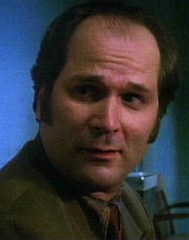
| |
Det. Don Schanke
|
Schanke twisted round as Stonetree left his office, with the new guy just a pace behind. He’d seen him go in, escorted by Persevich, who’d told the room that this was a transfer as soon as the door was shut. After which he’d gone back to filing, leaving a concerned buzz. The new guy made an odd number: someone was presumably transferring out. The question was who. No one would admit to putting in for a move; and there wasn’t a major shuffle going round. Someone, Schanke reckoned, had been putting both feet in it, and was probably headed for Traffic. For real. Either that or the new guy had some pull.
He’d not bothered to look closely at him as he’d gone by, not realizing what was going on. Still, he was too good a detective not to have registered the essentials. Thirtyish, fairish, tallish, and good looking in a way that Schanke wouldn’t put into words, even in his head (though he envied the luck the guy’d have with the ladies). And a black leather bomber jacket, like some hood biker. Yeah, just the sort of cop he loathed, all flash and attitude. He’d met them when he worked Vice, and again during his stint on the Drug Squad. They were the ones who thought they were better than anyone else on the force; and they were usually the ones who, in the end, brought I.A. down on themselves—and their partners.
He should have been heading home. Myra was going to kill him; and her pot roast would dry out (and she did cook a mean pot roast). Still he stayed, only half his attention on his overdue report, until the long palaver in Stonetree’s office finally ended, and the door opened.
He was relieved when the two turned the other way. At least probably he wasn’t the screw-up getting the boot. “Hey, I’d like you guys to meet Nick Knight,” he heard Stonetree say. “Knight, these’re Morris Thompson and Jack Kennedy.”
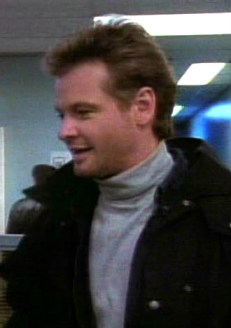 “No relation,” said Kennedy, as always, sticking out his hand. (A lousy joke, Schanke always thought, given the guy’s colour.)
“No relation,” said Kennedy, as always, sticking out his hand. (A lousy joke, Schanke always thought, given the guy’s colour.)
“Pleased to meet you,” said Knight. But he gave Stonetree an odd look; and Schanke wondered what was up.
“I’d like you two to take Knight round with you for a week or two,” said Stonetree. “Show him the ropes. He’s going to be on night shift.”
In Schanke’s opinion, this didn’t bode well for one of the two, who very likely was about to find himself transferred. From the glance the partners shared, it looked as though they had the same idea. It was the expression on Knight’s face that surprised Schanke, though: the new guy looked startled for some reason, and then as if he was just about to say something; and then he looked at the Captain real close, his eyes fixed on him. For a moment, it seemed as though he almost caught Stonetree’s eye; but the Captain turned suddenly round and spotted Schanke staring.
He looked quickly down at the form in the typewriter.
“Some guys,” Stonetree observed to the room, “ought to be paying attention to the clock, ’cause it’s well past the end of their shift … if you get what I mean.”
“Almost finished this report,” Schanke heard himself say—and felt like a fool, for it was the clearest possible admission that he was taking Stonetree’s words personally.
“Captain,” began the new guy.
“Yeah, Knight, I know,” Stonetree said, “and you will. But I read your file. You’re new to Toronto. I can’t have you getting lost, or spending half your time looking at a map. A couple of weeks riding with these guys and you’ll have a feel for the layout of the streets—not to mention the way we do things round here.”
“Of course, Captain, I understand,” Knight said. (Not that he had any choice, thought Schanke.)
The office door closed behind the Captain; and Knight joined the others, hauling over a chair from a desk whose rightful owner was off getting a statement. Schanke settled back to completing his form, with both ears open, and his focus on the other side of the room. Thompson and Kennedy were filling Knight in on their current cases: the old guy who’d been found on a bench in the park (path. report still pending), the hooker who got stabbed (not her pimp, apparently), the John Doe who’d been blown up (and if they hadn’t IDed him yet, they probably never would), and—this was the one that they were spending most of their time on—the robbery that had gone wrong when the homeowners returned to shut their open back-room window.
“Locking the barn door after the fox got in the henhouse,” he heard Thompson say.
“Those the crime-scene photos?” Knight asked.
The faint sound of riffled prints was covered by the winding of the platen as Schanke took the form out of the typewriter.
“I’m off!” he announced, loudly enough for Stonetree to hear it in his office, and grabbed his coat off the back of his chair. He was still trying to shove his arm down the second sleeve as he stuck the sheet of paper in his Out basket and headed out the door.
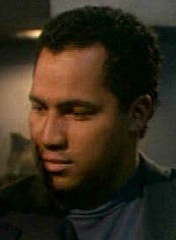
| |
Det. Jack Kennedy
|
Whatever the Captain said, Kennedy was still worried. He knew that he hadn’t put in for a transfer; and he was reasonably certain that, if Thompson wanted one, he’d have said something to his partner first. Still, someone was going to wind up with Knight; and it was suspicious that the two of them had been picked to baby-sit the new guy.
This was no regular transfer. You only had to look at the guy to see that.
Everyone in the squad room was listening, and no one was looking their way. It gave him the creeps—and it didn’t make it any better that he knew perfectly well that, if the positions were reversed, he’d be acting just the same.
Thompson was filling Knight in on the DeLisle case. Just an ordinary couple; and now he was bludgeoned, hanging on by a thread in Intensive Care in St. Mike’s; and she was raped and stabbed, and on a slab in the morgue.
“How’d he get in?” Knight asked.
“Open window at the back,” Thompson said. Knight raised a brow.
“Friends they were meeting for dinner said they called on one of those cellular phones to say they just remembered they left it open.”
“So they went back and walked in on it,” Knight realized.
“Locking the barn door after the fox got in the henhouse,” Thompson snorted. “Fat lot of good that did ’em. Some folks just ask for it!”
“Prints?” Knight asked.
“Not back yet.”
“Those the crime-scene photos?”
Thompson handed over the envelope; and Knight pulled them out. He took one quick shuffle through, and then—having oriented himself, Kennedy figured—began from the start, more slowly, checking one against the next. Eventually, he straightened the stack and slid it back in the envelope.
They headed out to the car park, studiously ignored by the other cops in the room. As they drove across downtown, Thompson kept leaning round to point out the sights—Church, Ryerson, the Yonge Street strip. Like a damned tour guide, Kennedy thought; but he knew that orienting the new guy was why he was with them. They were now only a few blocks north of the Eaton Centre, and there were plenty of shops still open: he had to drive around for a bit before he found a place to park, not too far from the Coroners Building.
At least Knight didn’t turn out to be the squeamish sort. His pale skin blanched no further when the scalpel slit Mrs. DeLisle from sternum to crotch: his eyes stayed on the guts: his voice was steady.
“I took a wet mount,” said the pathologist. “He didn’t use a condom: there’ll be evidence to test for one of those DNA matches, assuming you find a suspect.”
While they were there, Kennedy suggested they pop round to see if the report on the dead guy in the park was maybe ready. They caught Dr. Lambert just as she was heading out on a call. There was a queer startled look on her face for a moment; and Thompson asked if anything was wrong. But she hastily shook her head, and said it was just that they’d caught her at a busy moment. She headed back into her office, and grabbed the report off her desk. Kennedy started to look inside the folder; but she was out the door before he even had any questions, let alone got round to asking them.
“Sorry, guys. DBs don’t wait till they’re in the cold room," she said airily, and headed out the door. “Lock up behind you,” wafted back as she disappeared down the hall.
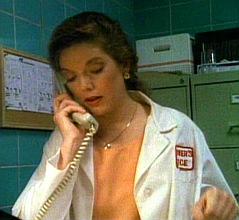
| |
Dr. Natalie Lambert
|
Natalie’d finished one autopsy already that evening, though it had proved to be nothing more exotic than a sudden coronary. She’d stitched up the Y-incision, shucked her gown and gloves into the bin, wheeled the gurney back into the walk-in fridge, and—because blood always seemed to go further than you’d think—started washing up at the sink, sleeves rolled high and soap all over her hands. Then the phone rang.
She hated when that happened. If she didn’t answer and they found out she’d been in the office, she got questions from above; but the phone always slid round in her wet hand, and she had to wipe off the soapsuds afterwards or get slime on her skin the next time it rang.
It appeared that someone had called in a body in a rooming house. She grabbed a pen and a pad, and scribbled down the address, annoyed to see that her fingers left wet marks. As the pen wrote over them further down the paper, it poked a slight hole; and she had to rewrite it all to be sure it was legible.
After she hung up, she went back to the sink and finished washing, and then took a sponge and a paper towel back to the desk to wipe the phone and the pen.
Finally, she was free to grab her bag out of the filing cabinet. Ripping the sheet off the pad, she headed for the door.
She was not two steps away when Thompson and Kennedy turned the corner. Her office was at the end of the hall: they could only be coming to see her.
Then, behind them….
Natalie stopped, feeling her blood drain to her feet.
What was he doing here? She’d been so careful, meeting him outside the morgue for fear of questions from one of her staff. For a horrible moment, she feared that the two detectives had found some evidence to connect him with the pipe-bomb case.
“Hey, Nat!” said Thompson easily. “You heading off somewhere?” Before she could answer, he went on, “Let me introduce you to the new guy.”
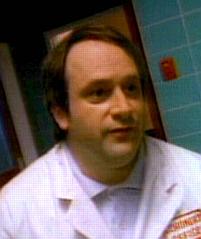
| |
Eddie
|
Dr. Lambert passed Eddie in the basement parking lot. “Can’t stop to chat. I’m running a bit late,” she called as she went by. He guessed there was a new body. Not his responsibility yet—though he expected he’d be getting the call once she’d cleared it for pick up. In the meantime, he went round to the back of the ambulance, opened the doors, and brought out the body bag he’d collected at Toronto Western. Why an autopsy had been ordered, he didn’t know. He usually didn’t, which was fine by him. He didn’t envy her, even though she must make twice his salary at least. He had dreams sometimes after he’d had to pick up one of the messy ones.
He took the freight elevator up from the basement, and pushed the gurney down the hall, heading for the cold room. He’d turned right, leaving the blind corridor to Dr. Lambert’s office behind him, when he heard the door open. Suddenly alert, he turned round—not that he was really expecting a body to rise up off the table—and saw three plainclothes cops coming out of her office. At least, he knew two of them were detectives (and his heart sank at the sight of them), so it figured that the third guy had to be, too.
“Hah! Eddie!” said the one in the lead. His name was Tomkins, or something like that. “Just the man we wanted to see. Have you remembered anything more about the pipe-bomb victim?”
Eddie quietly sighed. “Just let me get this stashed, will you?” he asked, pointing to the gurney.
They waited, with a patience that surprised him, and then escorted him into Dr. Lambert’s office, sitting him down on the stool that sat by the lab desk. Tomkins hitched himself up on her desk, his partner rolled over the chair by the computer, and the third guy leaned against the autopsy table.
They took him through it again. Why, he didn’t know: after all, he hadn’t got the call to the convenience store until long after the bomb. He had no idea who the victim had been or what he had looked like in life; and he strongly disliked being made to remember what he had looked like in death. But they knew all that, of course: their interest was in Eddie’s memory of the crime scene, the civilians who had been there, and what they had said and done. He got the impression they were matching what he said to some mental list of their own.
“Thanks,” Tomkins’ partner said. (Kennedy, his name was: like that dead president.) “You can get on with your work.”
“He didn’t mention that before,” said Thompson as they got into the car. “You noticed?”
“Yup.” Kennedy fastened his seatbelt and started the car.
Thompson twisted round to fill in the new guy. “The pipe bomb case. Customers in the store figured it for a robbery; but we knew it couldn’t be that. I mean … who takes a pipe bomb to a robbery? We figured it extortion related; but the store owner—Pankin—he kept saying no.”
“Yes,” said Knight. He sounded slightly impatient.
“We’re heading over there to talk to him again.”
Even as they drove to the convenience store, over which the Pankins lived, Thompson conscientiously pointed out the highlights of the route.
The bomb had made a mess. The crime scene tape had long since been taken down; but the plate glass window was still boarded up, and a notice on the door said that the store was closed for renovations. They headed down the narrow alley to the back door, and rang the bell. They had to ring twice, loud and hard, before finally Pankin came down to let them in. Thompson noticed he was carrying a baseball bat.
“You use that, you could get in real trouble,” he pointed out as they squeezed past into the narrow hall.
“More real trouble?” asked Pankin. “I never want trouble, Officer; but I get it anyway. You don’t see any customers in the store, do you?”
There was no answer to that; so Thompson simply said, “Your insurance should cover it,” knowing that, almost certainly, the guy’d skimped on his coverage, and it probably wouldn’t even quite cover the bomb damage, let alone loss of business.
They went up to the small apartment above the store, and sat in the tiny living room while Mrs. Pankin offered them tea—and then more tea, even though they’d refused the first time. Her husband still denied that anyone had attempted extortion; and, when Kennedy asserted that someone from the Russian mob had been spotted in the crowd outside, said that he didn’t know anything about that.
To keep him talking, they went back over the details again. It bored Thompson; and he knew that the repetition, of even so horrible a night as that, was probably starting to bore Pankin, as well.
“Can you remember any more about the guy who was killed?” he asked. “What did he look like?” There’d been no ID; the fingerprints had not been in the system; and the damage to the body—especially bad around the face—had meant no possibility of publishing a photo in the papers.
“He was fairly tall,” said Pankin, who was short. “Light hair. Ordinary clothes. I think he had a jacket.”
“Maybe if you came into the precinct, we could put you with a police artist again.” Again, because they’d done that once already, and got a picture that could be any white male in his thirties.
“Actually,” said Pankin, clearly struck by something he’d missed earlier, “he looked like him.” He pointed at Knight.
Thompson, whose attention was on the witness, almost missed the slight tension.
“Not that it was him,” Pankin added, with humour, “because he is alive now; and the dead guy is dead. Very, very dead. I am sorry, because he tried to help.”

Still sure that he knew more than he was telling, they headed back to the precinct. As always, the Captain came straight out of his office, wanting to be filled in.
“So where you going from here?” he said, finally.
“Pawnshops midtown?” Thompson offered. “We need to chase up the stuff stolen from the DeLisles’ house.”
They talked pawnshops. The phone in Stonetree’s office rang; but he ignored it. “Anything else?” he asked.
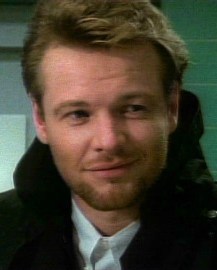 “We can close the Morinaka file,” Knight put in. Thompson was not sure where the “we” came from, and didn’t much care for it; but he didn’t say anything. “It was a heart attack.”
“We can close the Morinaka file,” Knight put in. Thompson was not sure where the “we” came from, and didn’t much care for it; but he didn’t say anything. “It was a heart attack.”
Kennedy pulled out the form that Dr. Lambert had filled out earlier that evening.
“File it and move on,” said Stonetree. The phone rang again. “Hang on, I’ve got to get this.”
He stepped back to his office. Thompson took the form from his partner and slipped it in the Morinaka file. He was about to lay it in the Out basket, but—spotting Persevich coming up the back hall—went over and handed it to him, instead. When he returned, he pulled out his chair and sat down. Knight had perched on the corner of his desk, a tad closer than Thompson really liked.
“So where’re you from?” he asked, shoving his chair a bit further out from the desk and tilting it back comfortably.
He was expecting to hear Vice or Robbery, not Chicago. It sort of took him aback. “You’re American?” he asked. Knight hadn’t particularly sounded American.
“Dual citizenship,” said Knight, after the briefest hesitation.
“Yeah, I figured it was something like that,” said Stonetree behind them.
Thompson looked round. The Captain had a piece of notepaper in his hand.
“I decided it was time to move on,” said Knight, quietly. “Move …back, I guess I should say.” He smiled. “No place like home, right?”
“Ain’t that the truth.” Stonetree allowed a pause for the sentiment to sink in, and then held up the note.
Thompson looked up at it. An address.
“You close one, you open one,” Stonetree said, and handed it over. “No, Knight—you stick around.”
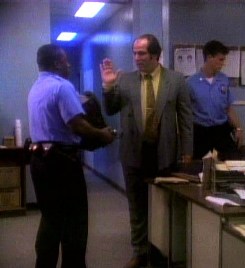
| |
Officer Persevich
with Schanke
|
Persevich took the file from Thompson—yet another file handed him by a plainclothes guy who figured he had nothing better to do—and headed out to the front desk, where he pigeonholed it. Maybe some day they’d get that computerized filing system installed; but he wasn’t holding his breath. In his view, sending Norma off on that course just left them short-handed.
A few minutes later, he came back with the deli delivery, doling out sandwiches to all who had ordered. When he knocked at the Captain’s door, though, there was no answer.
“He’s in,” someone said. “Talking to the new guy, I think.”
Persevich dithered. Should he interrupt? Normally, the answer would be no; but Stonetree had ordered corned beef, and the deli served it warm. Finally, he knocked again and, hearing a murmur inside, gently turned the handle and opened the door.
“…just make an exception,” he heard Knight say, in a low voice. He and Stonetree were standing rather close to each other in front of the framed display of police badges.
“It’ll be simpler all round, you know,” Knight said, softly.
“Simpler,” Stonetree echoed. “Yeah, make an exception for now, and see how it goes.”
Persevich coughed.
Knight turned swiftly to look at him, with a flash in his eye. Persevich felt a cold shock, but only for an instant. It was just a conversation between the Captain and a new transfer, that was all.
“I got your sandwich,” he said, holding up the paper bag. “Corned beef on rye, the fancy mustard, and a pickle on the side.”
“Oh, hey!” Stonetree leaned forward to grab it. “Thanks!” He went behind his desk and sat down, opening the bag.
There was nothing for Knight. “You weren’t here when I phoned in the order,” Persevich apologized. “You want me to get you something? I can phone it in easy.”
“No, that’s all right,” Knight said. “I’ll get something later.” He left Stonetree opening the waxed paper, pushed past Persevich in the doorway, and sat down at Kennedy’s desk.

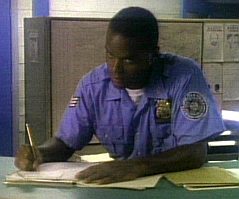
| |
the desk sergeant
|
Some time later, Persevich was back at the filing cabinets behind the front desk. He could hear the sergeant dealing with a prostitute and the uniformed officer who’d brought her in. It was routine for all of them; and he left them to it, and dealt with the forms. Once the two had headed to the holding cells, though, Persevich turned.
“Thank got it's not Friday,” he joked.
“Don’t jinx me!” the sergeant said, and a true note sounded under the jesting tone. He looked up as the main door swung open; but it was only one of the Crown lawyers. He came through the foyer, nodded at the desk sergeant, and headed left into to the detectives’ squad room.
“Can you take over here a bit?” asked the sergeant. “I gotta go to the can.”
“Sure.”
Persevich dealt with a lost dog, a stolen bike, and an irate neighbour. The sergeant came back with two cups of coffee. It was indeed a quiet night; and they chatted for a while about the Blue Jays’ chances in the game on Saturday, which neither of them reckoned to be good.
“You seen the new guy?” the sergeant said, in a low voice, mindful of the open door. “What’s he like?”
“Well, the Captain’s put him with Kennedy and Thompson. Leastways, he’s in there doing their paperwork. I showed him where the forms are. He seems okay.”
The fair-haired Crown came back out and asked if Officer Obregon was around. On being told that he and his partner were doing crowd control, he started to write a message.
“Hey, Rich!”
He turned. One of the detectives was standing in the door, holding up a briefcase.
“Not again?” He shook his head in mock dismay, and thrust the note at Persevich. Then he took the case with a quick “Thanks”, and strode out to the parking lot.
The sergeant and detective shared a glance. It wasn’t the first time, and no doubt wouldn’t be the last.
Persevich picked the empty cups off the desk and headed back round to drop them off in the bin by the coffee machine.
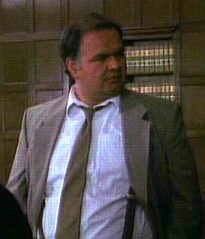
| |
Capt. Joe Stonetree
|
Through the door of his office Stonetree could hear Thompson ask Knight if he wanted a cup of coffee. “No, thanks,” he said (and you could hear he was smiling, Stonetree thought). “I’m not much into caffeine.”
“Well, get both of us some, eh?” said Thompson.
Stonetree knew he wasn’t about to let the new guy off the hook just because he wasn’t thirsty. “I take mine with creamer, no sugar,” he heard. “Jack goes for a double-double.”
He waited. You could tell a lot about a man by the way he reacted.
Then, with only the briefest hesitation, he heard Knight say, “Should I get one for the Captain?”
He smiled, and got up from his desk.
“Good idea,” said Thompson. “He likes his black.”
Stonetree opened his door. “Coffee machine’s other side of the front desk,” he said laconically. Knight looked a bit startled: the other guys knew Stonetree well, and took it in stride. “Ask the sergeant to point you.”
Knight nodded, and headed for the door. Stonetree waited until he was well out of the room. “So how’s it going with him?” he asked, keeping his voice down.
“Okay, I guess,” Kennedy said. “So far, anyway. It’s early days. Wait till he’s partnered up and working his own cases. Time will tell, right?”
“Proof of the pudding’s in his clearance rate,” Thompson added.
“Talking about clearance rates,” Stonetree said, in that slow suggestive way of his, “how’s about you fill me in on what you’ve been up to?” He headed back into his office. Thompson shrugged; and he and Kennedy followed, leaving the door open. A few minutes later, Knight returned with three cups and, Stonetree noted, doled them round right. A point in his favour. The guy could take orders.
It was past the shift change, and Stonetree wanted to leave as much as the detectives probably did. Once he’d heard the gist of what they had to say, he told Thompson and Kennedy they could write up their reports tomorrow, and reached for his jacket. Shrugging into it, he remembered.
“Oh, Knight! Hang on a minute.”
The others headed off to the locker room and home.
“Been thinking,” Stonetree said. “Look, about this business of letting you work alone….”
Knight looked a bit startled. Thinking he was about to interrupt, Stonetree put up a hand.
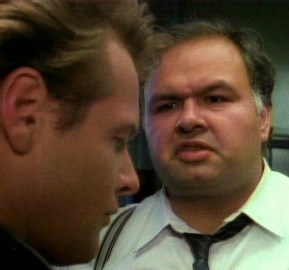 “No, hear me out. I get the medical thing. Still don’t know how you could pass the physical; but that’s not my call. You’re cleared for duty; and it’s got to be the night shift—I accept that. Working alone, though: it’s against policy.”
“No, hear me out. I get the medical thing. Still don’t know how you could pass the physical; but that’s not my call. You’re cleared for duty; and it’s got to be the night shift—I accept that. Working alone, though: it’s against policy.”
“Captain….”
“Departmental policy,” Stonetree emphasized. “Quite apart from my own policy.”
He expected an argument. Instead, Knight somehow seemed to loom closer, though Stonetree was sure he hadn’t actually shifted place. Maybe the sun was in his eyes.
Stonetree blinked. Knight was standing right where he’d thought he was, a few feet away. Shaking his head to clear it, Stonetree went to pull up the blinds. He opened the glass for a couple of inches of fresh air, looked out at the grey of dawn, and then let the blinds fall again.
Beside him he could feel the proximity of Knight’s body, just a little too close.
“Captain,” Knight said.
It was a low, soft word; and Stonetree turned towards it. Knight’s eyes were big and blue, like a summer lake. He swam in that lake; and the sun came up golden, shimmering over the blue.
“Does it really make sense…?” the wind whispered over the water. Well, it didn’t really. No sense at all.
“…surely easier for me to work alone.” Perhaps, perhaps.
“Just try it for a while,” said the wind.
“…and see how it goes.” He spoke aloud, and thought he heard an echo in the words.

At home in bed, he wondered why he’d changed his mind. He wasn’t usually so ready to bend the rules. Knight had some good arguments, of course. And, despite his first impression, Stonetree found he sort of liked the guy. Yeah, he was okay. Still….
There’s something about him, he thought. I don’t know what it is, but there’s definitely something.
|
NOTES
This story was written for lastscorpion in FK Fic Fest 2011 to the prompt, “Any story
with Joe Stonetree being awesome!”. It was beta’d by amilyn, and posted on LiveJournal
here on 16 July 2011, being released
from the queue on 20 July 2011. It has also been posted on AO3.
 Detectives Kennedy and Thompson are original characters. However, this is not to say that we’ve
never seen them. Take a look at this shot of the celebration party in “False Witness” after Murray
Kozak was arrested. I’m sure they’re both in there somewhere! In fact, I’ve made Kennedy
the detective who was in the surveillance van with Schanke in that episode.
Detectives Kennedy and Thompson are original characters. However, this is not to say that we’ve
never seen them. Take a look at this shot of the celebration party in “False Witness” after Murray
Kozak was arrested. I’m sure they’re both in there somewhere! In fact, I’ve made Kennedy
the detective who was in the surveillance van with Schanke in that episode.
 With the obvious exception of the victims and witnesses (and Detectives Thompson and Kennedy), the named characters in this story all appear or are mentioned in Forever Knight. With the obvious exception of the victims and witnesses (and Detectives Thompson and Kennedy), the named characters in this story all appear or are mentioned in Forever Knight.
 “Vetter’s kid” is, of course, Tracy—Nick’s partner in Season Three. “Vetter’s kid” is, of course, Tracy—Nick’s partner in Season Three.
 Wally Lee is mentioned in “Cherry Blossoms” as a Chinese-speaking detective they can bring in on the case, although in the end they don’t. Wally Lee is mentioned in “Cherry Blossoms” as a Chinese-speaking detective they can bring in on the case, although in the end they don’t.
 Persevich appears very briefly in “Dead Issue”, carrying a stack of files. Persevich appears very briefly in “Dead Issue”, carrying a stack of files.
 Obregon—who is only mentioned in the story—has a rather larger part in the same episode. Obregon—who is only mentioned in the story—has a rather larger part in the same episode.
 In passing, Persevich mentions Norma Alves, who is the woman in “Hunters” who discovers that Nick has no file in the new computer system. In passing, Persevich mentions Norma Alves, who is the woman in “Hunters” who discovers that Nick has no file in the new computer system.
 Eddie comes from the flashback in “Only the Lonely”. He is the guy who brings Natalie the body bag that has Nick in it, and tells her it contains the corpse of a man blown up by a pipe bomb while trying to stop a robbery. Eddie comes from the flashback in “Only the Lonely”. He is the guy who brings Natalie the body bag that has Nick in it, and tells her it contains the corpse of a man blown up by a pipe bomb while trying to stop a robbery.
 The Crown counsel called “Rich” is Natalie’s brother (“Richie”, as she calls him), who died in “I Will Repay”. He forgot his briefcase in that episode, too: he left it in her car when she gave him a lift to the 27th Precinct police station. The Crown counsel called “Rich” is Natalie’s brother (“Richie”, as she calls him), who died in “I Will Repay”. He forgot his briefcase in that episode, too: he left it in her car when she gave him a lift to the 27th Precinct police station.
|
|
|
|
|